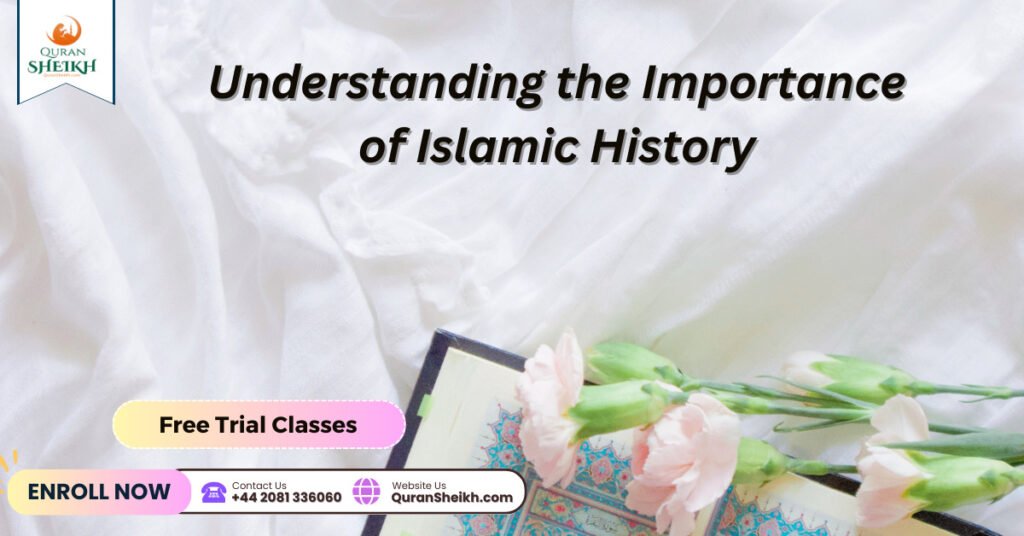Enroll in online Islamic history courses and gain a more profound comprehension of the diverse culture and tradition that embodies the Islamic world.
E-learning platforms and online education have transformed access to Islamic history courses in modern times, offering students from all walks of life a chance to learn through digital means instead of solely through traditional academic settings.
Through this article, we will examine the advantages of learning Islamic history through online means, assess prominent courses and platforms, and provide guidance on selecting a course that caters to your preferences and expectations.
Online Islamic history courses provide ample prospects for personal and professional development, whether you aspire to enhance your knowledge about Islam and its past or aim to forge a career in the field.
Join thousands of Muslim Families who love learning Quran, Arabic and Islamic Studies from the comfort of their Homes.
Introduction to Islamic History Courses Online
Studying the Islamic world’s religion, culture and politics throughout history is an intriguing and bountiful subject matter. With online Islamic history classes, one can easily learn about the subject matter without leaving the house.This write-up delves into the value of Islamic history and how an online course can be beneficial for learners.
What is Islamic history?
From the early 7th century to present day, Islamic history speaks of the Muslim world’s events since the time of its prophet Muhammad. Within it, you will find the emergence of the Islamic religion, the evolution of politics and society in Islamic empires, as well as informative cultural influences from Muslim scholars and artists.
Why study Islamic history online?
Learning about Islamic history via online platforms offers many perks, like personalized learning opportunities, access to more diverse courses and resources, and the convenience of balancing studies with work and personal life. Online classes often provide comparable quality instruction to those on-campus, with the added benefit of being less expensive.
Understanding the Importance of Islamic History

The role of Islamic history in Islamic culture and religion
Islamic culture and religion are greatly influenced by the significance of Islamic history. Understanding the historical context in which Muslim beliefs, practices, and values evolved is facilitated by this foundation. The identity and outlook of Muslim communities across the globe are molded by Islamic history as well.
How Islamic history is relevant in today’s world
The relevance of Islamic history in our modern world is due to the valuable insights it offers into the social and political landscapes of the Muslim community, as well as the historical origins of contemporary events. It provides a more extensive outlook regarding the interconnectivity of global history, displaying how different societies and civilizations have influenced and interacted with the Islamic world.
Quran Memorization Course Online with an Arab teacher with 30% Off
Top Online Islamic History Courses for Students

Overview of popular online courses
A vast array of topics, including both the life of Muhammad and Islamic scholars’ artistic and intellectual accomplishments, are covered by online courses on Islamic history.
The University of Edinburgh offers the well-known online course Introduction to Islamic Civilization, and Harvard University provides another popular option with their offering of Islamic History: Sunnis and Shiites.
Reviews and recommendations
A critical aspect to contemplate when picking an internet-based Islamic history class is the caliber of its curriculum, the competence of its instructors, and the reliability of its educational organization. If you’re on the hunt for superior courses, be sure to peruse feedback submitted by fellow learners and enlist guidance from seasoned industry authorities.
Benefits of Enrolling in an Online Islamic History Course

Flexibility and convenience of online courses
The flexibility and convenience provided by an online Islamic history course are some of its key advantages.With online courses, studying can be done at a pace that works for you, regardless of the location and time constraints.
This is a significant benefit for learners with work or other responsibilities that impede their ability to participate in conventional in-person courses.
Access to expert instructors and resources
In addition to your local area, you can gain access to expert instructors and resources through online courses. Top-notch scholars and experts in various fields lead many online courses, which also provide an extensive collection of digital resources like videos, readings, and interactive online tools.
Enrich your educational experience and acquire a thorough comprehension of the history of Islam with this enhancement.
How to Choose the Right Islamic History Course Online
By enrolling in an online course, you can unearth the history of Islam with efficiency as it offers flexibility and convenience to learn from any corner of the world.
Navigating the wealth of options can make it overwhelming to choose the suitable course.Here are some factors to consider when selecting an online Islamic history course:
Factors to consider when selecting an online course
– Accreditation: Look for courses that are accredited by recognized institutions to ensure that you’re getting a quality education.
– Course content: Check the course description and syllabus to see if they cover the topics that interest you.
– Instructor credentials: Research the instructor’s background and experience in the field to ensure that they are qualified and knowledgeable.
– Student reviews: Read student reviews and ratings to get a sense of the course’s effectiveness and the instructor’s teaching style.
– Cost: Compare the fees and payment options of different courses to see which one fits your budget.
Comparison of different online courses and platforms
Islamic history courses are widely available online, with platforms such as Coursera, edX, and Udemy offering them. Online courses are also provided by establishments such as Harvard University and Georgetown University.
Every platform boasts its own distinct characteristics and advantages. For example, Coursera offers courses from top universities around the world, while edX provides courses that are offered by reputable institutions and are verified for academic credit.
Udemy, on the other hand, offers a wide range of affordable courses with lifetime access.
When comparing courses, consider the course content, instructor credentials, and student reviews, as well as the cost and platform features.
The Future of Islamic History Courses Online
Emerging trends and developments in online education
The rise of online education has been notable in recent times, with predictions suggesting this pattern will continue. To increase the educational experience, online courses are incorporating modern technologies like artificial intelligence and virtual reality.
Potential for expanding access to Islamic history education
Online learning has the power to broaden the scope of Islamic history education, allowing people who previously experienced obstacles in terms of location and finances to complete their studies. This presents an opportunity to promote greater understanding and appreciation of Islamic history and culture.
Career Opportunities in Islamic History Studies
Career paths for graduates of Islamic history programs
Graduates of Islamic history programs can pursue a variety of career paths.Professors, researchers, and archivists in academia, diplomats, analysts, and policy advisors in the government are some of the possible options.
Additionally, possibilities abound in the media industry, non-profit organizations, or private companies engaged in realms like global affairs, religious harmony, or cultural exchange.
Skills and knowledge gained through Islamic history studies
The study of Islamic history enables the acquisition of diverse and useful abilities such as critical thinking, research, analysis, and communication skills. Additionally, it imparts a profound comprehension of Islamic civilization and past that proves valuable in numerous disciplines and scenarios.
Conclusion: Enhancing Your Knowledge of Islamic History Online
Summary of key points
When selecting an online Islamic history course, consider factors such as accreditation, course content, instructor credentials, student reviews, and cost.
Different online platforms offer unique features and benefits, such as access to courses from top universities or affordable lifelong learning options.
Online education has the potential to expand access to Islamic history education and promote greater understanding and appreciation of Islamic culture.
Graduates of Islamic history programs can pursue a variety of career paths and develop valuable skills and knowledge.
Final thoughts and tips for success in online Islamic history courses
To make the most of your online Islamic history course, be sure to stay organized, manage your time effectively, and participate in online discussions and activities. Don’t let fear prevent you from seeking advice or asking questions if necessary.
Make sure to appreciate the journey of learning and feel proud as you deepen your understanding of Islamic history.
Finally, taking online courses in Islamic history is a convenient and efficient approach to gain a more profound understanding and respect for the diverse culture of Islam and its historical background.
Selecting the right course and framework can enhance your personal growth and professional prospects.
An extraordinary prospect is presented to anyone captivated by Islamic history – from students to scholars to mere enthusiasts – as they can now learn and delve deep into this fascinating subject at their leisure through online courses.
So why wait? Start exploring the many options available and embark on a journey of discovery today!
What should I read for Islamic studies?
The Quran is the central religious text of Islam, and it is essential for any student of Islamic studies to have a good understanding of it. There are many different translations and commentaries available, so it is important to choose one that is appropriate for your level of knowledge and interest. In addition to the Quran, there are many other important texts in Islamic literature, such as the Hadith (collections of sayings and actions of the Prophet Muhammad), the Sunnah (the example of the Prophet Muhammad), and the Sharia (Islamic law).
Here are some specific recommendations for reading materials on Islamic studies:
- The Quran: There are many different translations of the Quran available, but some popular ones include the Sahih International translation and the Yusuf Ali translation.
- The Hadith: There are also many different collections of Hadith available, but some popular ones include the Sahih al-Bukhari and the Sahih Muslim collections.
- The Sunnah: The Sunnah is often studied through biographies of the Prophet Muhammad, such as the Seerah by Ibn Ishaq.
- The Sharia: The Sharia is a complex and multifaceted topic, but there are many introductory texts available, such as the Introduction to Islamic Law by Wael B. Hallaq.
In addition to these general texts, there are also many books and articles available on specific aspects of Islamic studies, such as Islamic history, theology, philosophy, and law. When choosing reading materials, it is important to consider your own interests and goals. If you are new to Islamic studies, it is a good idea to start with some general texts to get a basic understanding of the religion. As you learn more, you can then specialize in areas that are of particular interest to you
How long does it take to study Islamic studies?
The time it takes to study Islamic studies can vary depending on a number of factors, including the level of study, the intensity of the program, and the individual student’s learning style. However, in general, a bachelor’s degree in Islamic studies takes four years to complete, while a master’s degree typically takes two years. A doctoral degree in Islamic studies can take anywhere from three to seven years to complete.
In addition to formal coursework, many students of Islamic studies also choose to pursue internships or volunteer opportunities in Muslim communities. This can help students gain hands-on experience and develop their skills in Islamic education, social services, and other related fields.
Ultimately, the amount of time it takes to study Islamic studies depends on the individual student’s goals and aspirations. For some students, a bachelor’s degree may be sufficient, while others may choose to pursue advanced degrees or specialize in a particular area of Islamic studies.
Here are some additional factors that can affect the time it takes to study Islamic studies:
- The student’s prior knowledge of Islam and Arabic language skills.
- The student’s ability to learn and retain information.
- The student’s motivation and commitment to their studies.
- The resources available to the student, such as access to libraries, qualified instructors, and study groups.
If you are interested in studying Islamic studies, it is important to do your research and find a program that is a good fit for your needs and goals. You should also consider the factors listed above that can affect the time it takes to complete your studies.
Can you study Islam online?
Yes, you can study Islam online. There are many websites and online courses that offer a variety of Islamic studies courses. You can also find many Islamic books and articles online. However, it is important to choose a reputable source when studying Islam online, as there is a lot of misinformation out there.
One of the benefits of studying Islam online is that it is convenient and flexible. You can study at your own pace and on your own time. You can also choose from a wide variety of courses, so you can find one that is right for you.
Another benefit of studying Islam online is that it can be a more affordable way to learn about Islam than taking traditional courses at a mosque or university. Many online courses are free or very low-cost.
However, there are also some challenges to studying Islam online. One challenge is that it can be difficult to stay motivated when studying independently. It is also important to be able to evaluate the sources of information that you find online.
If you are considering studying Islam online, I recommend that you do your research and choose a reputable source. You should also start with a basic course on Islam before moving on to more advanced topics.
Best Quran memorization program with qualified Arab tutors and get 30% OFF, Quran classes for Kids
(FAQ)
Are online Islamic history courses as rigorous as traditional courses?
Yes, online Islamic history courses are designed to be just as rigorous and challenging as traditional courses. Many virtual courses actually have the same educators as physical classrooms.
Flexibility and convenience are the defining features of online courses as they provide a unique delivery method, allowing students to study according to their schedules and pace.
What are some common career paths for graduates of Islamic history programs?
Academia, journalism, social work, international relations, and government service are all potential career paths for those who complete an Islamic history program.
Islamic history is also a valuable asset for students seeking opportunities in the nonprofit industry, using their knowledge to impact organizations that prioritize education, aid work, and community growth.
How do I choose the right online Islamic history course for me?
When choosing an online Islamic history course, it is important to consider factors such as course content, instructor qualifications, cost, and flexibility.
Seek out lessons that concentrate on themes that grab your curiosity, instructed by professors who specialize in the field. Its a good idea to take into account the online reviews and ratings from other students when evaluating the courses quality and general experience.
Can I earn academic credit for online Islamic history courses?
Yes, many online Islamic history courses offer academic credit that can be applied toward a degree or certification program. Make sure to confirm that the credits are transferable and recognized by reaching out to your school or program. You should read the class description thoroughly, for a few courses may request more evaluations or tasks to obtain credits.


